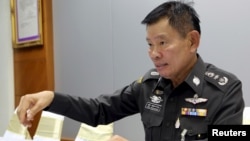Thailand's military government has introduced a new strategy to curb the insurgency that has rumbled on in the country's jungle-blanketed deep south for more than a decade: DNA swabbing.
The government has been widely panned for mishandling the economy and undermining democracy, but the top brass who seized power a year ago can point to a drop of more than 50 percent in attacks by Muslim Malay rebels across the restive region.
The police chief put in charge by the junta of the southern provinces bordering Malaysia told Reuters that DNA samples have now been taken from more than 40,000 people, making arrests and prosecutions easier.
Resistance to Buddhist rule in the south spilled over in 2004. Since then, more than 6,500 people — most of them civilians — have died in violence, which has included shootings and bomb attacks. Successive governments have failed to quell the separatist trouble.
The Muslim Attorney Center in Pattani province said security-related charges this year are set to exceed 2014's, in part because more DNA evidence is being used. Last year, 37 people were charged in the province; in the first four months of this year, the figure was 22.
Reuters was denied entry to the DNA labs by police pending permission from the Royal Thai Army.
More friction among locals
While the military credits DNA collecting for the decrease in violence, lawyers and activists say the forced sweeps are further alienating locals in the Muslim-dominated provinces of Pattani, Yala and Narathiwat that were annexed by Thailand a century ago.
Zawawee Pi, 26, a community radio member in Pattani, said he had been DNA-tested three times already. The fourth time, early this year, he refused.
Zaweewee, who has no criminal record, said a police officer came to his door asking for fingerprints and a saliva sample. When he refused, the officer threatened him with a gun.
"They said they wanted evidence in case I did something wrong in the future. Why test for a crime I have yet to commit?" he asked.
Lawyer Abdul Aziz of the Muslim Attorney Center said DNA collections were fueling distrust. "DNA does not lie — a match is a match — but the problem is the collection process. What is their technique?" he said.
Major General Anurut Kritsanakaraket, commander of the Southern Border Provinces Police Operation Center, denied his forces were being heavy-handed. He said that DNA testing, which includes saliva swabs of suspected rebels and analysis of post-blast explosive residues, was not arbitrary.
Resentment in south
The military's heavy presence and perceived tough line has stoked resentment among many in the southern provinces.
Last month, a group of villagers were gathered at a house in a remote Pattani village when nine cars drove up, said Marongsee Tayee, 23, one of those present. Without warning, the soldiers and police opened fire, killing four men. A panel set up to investigate the deaths found that none of those killed had a connection to the insurgency.
The military said the operation was intended to arrest insurgents, but later offered a rare apology.
Manasye Wanu, whose brother died in the attack, said that when soldiers came to apologize, his mother chased them away with a kitchen knife.
"Knock on any door in this area, and they will tell you they do not trust the Thai state," he said.
Marongsee and 21 others were detained for up to nine days. He was later released without charge.
Shintaro Hara, a Malay-language professor at Prince of Songkhla University in Pattani, said little had changed in the south. "We have stagnation," he said. "There is no will by authorities to offer long-lasting solutions."





